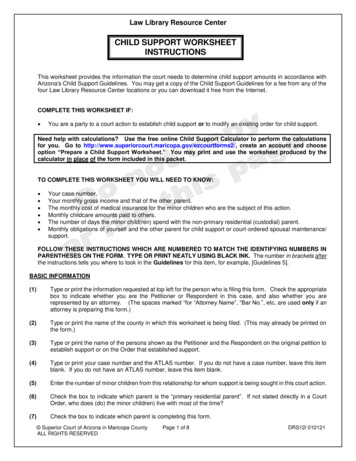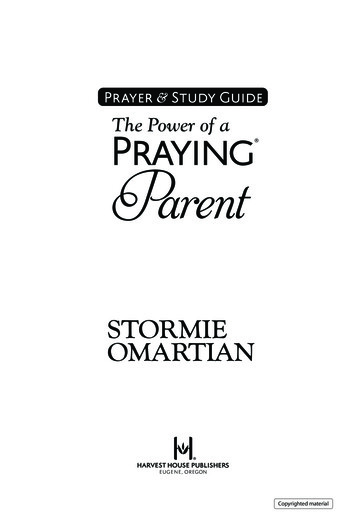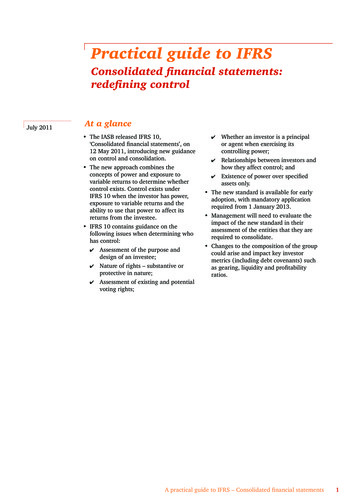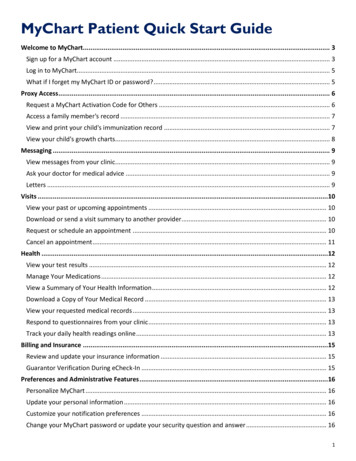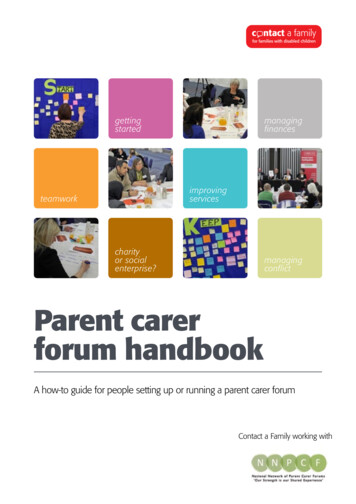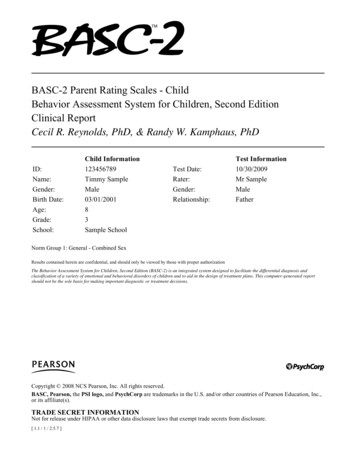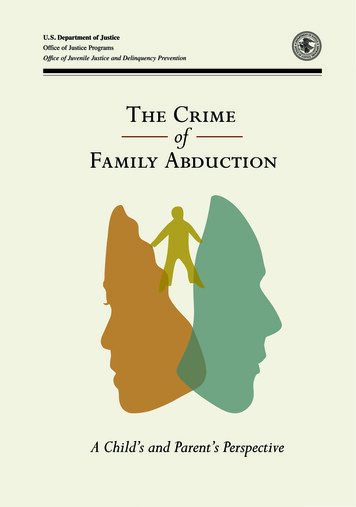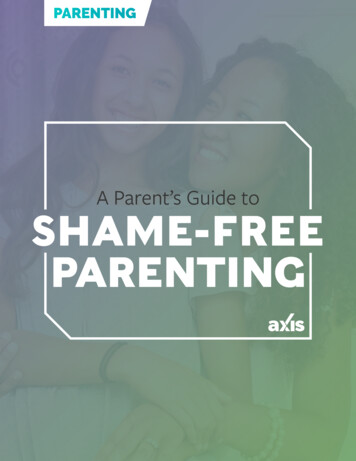
Transcription
PARENTINGA Parent’s Guide toSHAME-FREEPARENTING
“Shame starts at home. Fortunately, sodoes shame resilience. As parents, wehave the opportunity to raise childrenwho are courageous, compassionate,and connected. We can choose tolearn the tools we need to parentwithout using shame. We can eventeach our children empathy skills. Butas you might guess, before we canteach or model these skills, we mustunderstand the role shame plays inour own lives and practice resiliencein our relationships.—Dr. Brené Brown
A Parent’s Guide toSHAME-FREE PARENTINGContentsWe all need to figure out how to deal with shame. . . . . . . . . . . . . .Why do I need to be concerned about shame?. . . . . . . . . . . . . . . . . .What exactly is shame? Is it different from guilt?. . . . . . . . . . . . . . . .What are the effects of not knowing how to deal with it?. . . . . . . .What causes it?. . . . . . . . . . . . . . . . . . . . . . . . . . . . . . . . . . . . . . . . . . . . .What distinguishes it from other emotions?. . . . . . . . . . . . . . . . . . . .Is it different for men and women?. . . . . . . . . . . . . . . . . . . . . . . . . . . .How does family contribute?. . . . . . . . . . . . . . . . . . . . . . . . . . . . . . . . .Does culture contribute? . . . . . . . . . . . . . . . . . . . . . . . . . . . . . . . . . . . .Does the Church contribute?. . . . . . . . . . . . . . . . . . . . . . . . . . . . . . . . .How do we deal with shame poorly?. . . . . . . . . . . . . . . . . . . . . . . . . . .What happens internally when we succumb to shame?. . . . . . . . . .What light does God’s Word shine on shame?. . . . . . . . . . . . . . . . . .How do vulnerability and empathy help?. . . . . . . . . . . . . . . . . . . . . . .What happens internally when we deal with shame well? . . . . . . . .How does this relate to how I discipline and correct my kids? . . . .How can I create an atmosphere of shame resilience?. . . . . . . . . . .How can I know if I’m parenting from a place of shame?. . . . . . . . .Final thoughts. . . . . . . . . . . . . . . . . . . . . . . . . . . . . . . . . . . . . . . . . . . . . .Related Axis Resources. . . . . . . . . . . . . . . . . . . . . . . . . . . . . . . . . . . . . .Additional Resources. . . . . . . . . . . . . . . . . . . . . . . . . . . . . . . . . . . . . . . .Recap . . . . . . . . . . . . . . . . . . . . . . . . . . . . . . . . . . . . . . . . . . . . . . . . . . . . .Discussion Questions. . . . . . . . . . . . . . . . . . . . . . . . . . . . . . . . . . . . . . . .112233445677810111113131515161718
We all need to figure out how to deal withshame.We’ve all felt it—that sick feeling in the pit of our stomachs. A sense of completeunworthiness and isolation, an awareness that we are utterly unlovable. That feeling isshame, and it’s something everyone experiences. We feel shame for how we look, ourpersonalities, failing others and ourselves, saying the wrong thing at the wrong time—you name it. If there is anything in life that matters to us, we will have to navigate shamein that area because we are imperfect people.As parents, it’s crucial that we first recognize how to deal with our own shame and thenevaluate what messages about shame we’re communicating to our children. Shameis powerful and unavoidable, but if we learn to recognize and navigate it, we and ourchildren can actually learn to be stronger people because of it.Note: Though shame is a universal experience, it’s only in recent years that peoplehave begun studying, writing, and talking about it because it was, well, shameful to doso. For that reason, we have relied heavily on the (excellent) research of a few for thisGuide.Why do I need to be concerned about shame?Dr. Brené Brown, who’s done extensive research on shame and vulnerability, says inher book I Thought It Was Just Me (But It Isn’t), “Most of us, if not all, have builtsignificant parts of our lives around shame.” Parenting is a major area of life where weexperience shame. It’s extremely tempting for us to feel shame both because of ourown performance as parents and because of the behavior of our children. And often,if we feel shame over something our kids do, we end up transferring that shame ontoour children either purposefully or inadvertently. Brown says that parents (includingherself) are “very susceptible to using shame, fear, and judgment against children whenthey engage in behaviors that damage the ‘parenting image’ we are trying to create.”Back to Table of Contents1 2019 Axis
What exactly is shame? Is it different fromguilt?In I Thought It Was Just Me, Dr. Brown defines shame as “the intensely painful feelingor experience of believing we are flawed and therefore unworthy of acceptance andbelonging.” There’s also an element of vulnerability in shame: Somehow, we are exposedor laid bare for others to see, and they disapprove of what they see. Shame tells uswe’re not good enough. It looks at our failures or perceived failures and tells us that’swho we are and all we’ll ever be.But Dr. Brown distinguishes shame—which focuses on our identities—from guilt—which focuses on our behavior. Whereas guilt is constructive because it motivates usto do better, shame is destructive because it locks us into an identity based on ourbehavior. Shame says, “You’re a liar,” instead of, “You’re someone who struggles withlying” or “You told a lie.” By making the behavior of lying the person’s identity, shameimplies that it’s impossible for the liar to be anything else.What are the effects of not knowing how todeal with it?Research shows that having unresolved shame is strongly tied to: addiction depression suicide eating disorders violenceIn addition, because shame twists and distorts our identities, telling us that our behaviorsdefine us, it is never helpful as a way of motivating people to make positive change intheir lives. Instead, it actually paralyzes us by isolating us from and destroying the humanconnection that gives meaning to our lives and helps us want to be better. It keeps usfrom being vulnerable, which can eventually ruin our relationships. People hate talkingabout shame, yet over and over again, Brown says that secrecy and isolation makeshame grow exponentially. The less people talk about their shame, the more shameBack to Table of Contents2 2019 Axis
they experience. So it’s also a cycle from which it can be hard to break free.What causes it?Unsurprisingly, it really depends on the person. Someone could feel extreme shameover something that someone else would never even think about. The impact of shameon a person can look like anything from a fear of not wearing makeup in public to fearof posting on Facebook, playing charades, or asking someone out.A friend of ours recently witnessed a “minor” example of a mother shaming her sonat the grocery store. Our friend was ordering meat at the deli counter, and the momhad sent her son, who was around 11 years old, to order cheese. The son told the manworking at the counter that he needed some parmesan. The man was kind, but saidthey didn’t have that kind of cheese and asked if the boy was sure he had the nameright. The mom came up soon after, and it turned out she wanted provolone. She thenturned to her to her son and said, “I just told you it was provolone, and you couldn’teven remember that?”It didn’t appear the boy was being anything other than forgetful. But even if he haddone something wrong, there was nothing helpful or redeeming about his mom publiclyshaming him for forgetting what she’d told him. Instead of separating his behavior fromhim, she implied that there was something wrong with him because he’d failed in thistask. This is a small example, relatively speaking, but the message she sent him aboutwho he was and the shame she imparted were significant. He was made to feel small,unworthy, and incapable.What distinguishes it from other emotions?It’s important to be aware that we don’t actually have to do anything to feel shame.Shame could arise simply from the fear that someone will find out something bad aboutus. What’s more, in an interview with Axis, Christian author and psychologist Dr. DanAllender points out that shame is unique from other emotions in that it’s contagious.We can experience shame simply from observing other people who areBack to Table of Contents3 2019 Axis
experiencing shame.Drs. Brown and Allender both agree that people are often unaware of just how muchshame is impacting their behavior. People might think they have an anger problemor that they’re perfectionists, when the deeper reality is that shame is driving them.Allender notes—and this is key!—that we react to shame similarly to how wedeal with trauma. Because we don’t want to remember our shame or the eventsthat caused it, we detach ourselves from those experiences. We try to fragment ouremotions and numb our feelings.Is it different for men and women?In Men, Women, and Worthiness, Dr. Brown makes the remarkable statement thatgender is key to understanding shame. In fact, she says, it’s impossible to developshame resilience while ignoring the fact that gender drives our experience of shame.How men and women experience shame is the same, but the reasons why they doare different. Women face incredible pressure to effortlessly meet an overwhelmingnumber of conflicting standards and expectations. Appearance is an almost universalshame trigger for women: 90% of them feel shame about their bodies. On the otherhand, the overwhelming pressure that men face is never to fail or appear weak. Theirprimary shame triggers come from their professional identities, status, and money.Knowing the reasons behind each gender’s shame then help us to better identify howto address the same.How does family contribute?Brown writes, “In my research it was painfully clear that the shaming wounds inflictedin our first families often set the stage for many of our greatest shame struggles.” Forexample, one of Brown’s family messages was, “We don’t get sick.” So if any kind ofillness gets in the way of her doing her job or fulfilling her responsibilities as a mom, shedeals with shame about that.Back to Table of Contents4 2019 Axis
Other messages could be, “We don’t tolerate wastefulness” or “We can make it throughanything.” One woman we talked to realized that one of her family messages was,“Sleeping in is lazy.” She realized that whenever she sleeps in, she often feels guilty fordoing so, regardless of her reasons, because she’s internalized her first family’s message.A man we talked to says that a message in his family was, “We get good grades.” Becauseof this mindset, growing up he felt shame if he ever got any grade lower than an A.This is so tricky, because you’ll notice that all of these messages are based on good ideasand values. Where they go wrong is by never permitting any kind of failure or allowingfor any kind of grace. Also, it’s important to be clear that what they were feeling was notguilt. Guilt would be experienced if the man had gotten a B because he knew he didn’twork as hard as he could have or if the woman had slept in out of pure laziness. Theguilt would clearly be based in a behavior (doing something wrong or not doing one’sbest), whereas shame is based in identity (“I slept in, therefore I am lazy” or “I got a badgrade, therefore I’m not smart”) and doesn’t take circumstances into account.Does culture contribute?Absolutely. However, what drives shame in Millennials (b. early 1980s to late 1990s)and Gen Z (b. late 1990s to late 2010s) is slightly different from what caused shamein previous generations. Brown writes that despite families of origin being the mostinfluential voices in our lives, other influences are also powerful:[I talked to] many people who struggle with shame around issues that stem fromother places—namely cultural messages and stereotypes. This is especially trueof women and men who are under forty. For many people in this age group, themedia has become the primary storyteller of their lives.So what standards is culture telling us we’re supposed to meet? Well, its messagesare conflicting. One of them is that weakness is not allowed. Because vulnerability is atype of weakness, there’s no room for vulnerability. Yet at the same time, our culturecelebrates authenticity (which is also a kind of weakness) and cannot stand hypocrisy.There are too many cultural messages to list all of them, but here are a few other ones: All of us, but especially women, are expected to meet impossible standards ofbeauty.Back to Table of Contents5 2019 Axis
Our culture is highly individualistic, making it more likely we’ll experience shameif we have to ask for help. It almost seems superfluous to mention how common it is for people to shameeach other online for the slightest mistake. One semi-recent example of this waswhen J.R. Smith of the Cleveland Cavaliers failed to take a winning shot becausehe thought the Cavs were ahead of the Golden State Warriors during the NBAFinals. The teams were actually tied, so the game went into overtime and theWarriors ended up winning. The internet was not forgiving. What message doesthis send? That you can’t make one single mistake in your career without seriouslypaying for it in public shame.If you’re not sure how culture is influencing your kids, it might require observing andtalking to them to figure it out. But look for areas where they feel like less of a personor unvaluable. Most likely it’s because of a standard they’ve accepted that they also feellike they don’t meet for one reason or another.Does the Church contribute?Sadly, Christian culture is notably uncomfortable with making space for people’sbrokenness. On the one hand, as mental health counselor Andrew J. Bauman pointsout, so much of the focus in Christendom is on our sinfulness and so little on ourredemption that it seems our sinfulness is truer than our salvation. On the otherhand, we contradictorily think that others will perceive us as “bad Christians” if weacknowledge that we struggle with “shameful sins,” like porn addiction or same-sexattraction. Christians might fear being shamed or misunderstood if they admit they’vehad an abortion or experienced sexual abuse. It’s not just “unacceptable sins” that wecan feel shame over but also for our social status or season of life. The church oftenemphasizes marriage and family so much that it’s easy for singles to feel shame for notbeing in a relationship (secular culture makes this problem harder, too).Now that we’ve looked at the major contributors to shame, it might be a goodtime to stop reading and think for a few minutes about what messages you may havereceived or internalized when you were younger. Write them down so you can referback to them later. Once you’re done with that, take a few more minutes to think aboutBack to Table of Contents6 2019 Axis
messages that you (or others) might be purposefully or inadvertently teaching yourkids. They could be good messages at their core, but if they’re communicated in a waythat’s too black and white, it could be causing harm. Write those down, too.How do we deal with shame poorly?Shame is intolerable, so we have to deal with it somehow. Often, that means indysfunctional ways, such as: numbing ourselves/self-medicating/addiction; resisting uncertainty (fear makes us vulnerable); blame-shifting’ ignoring it and pretending that everything is ok; and trying to fix and perfect ourselves (and others).In addition, Dr. Allender says that one of the most common ways of dealing with shameis contempt, either for ourselves or for others. Another “solution” is false forgiveness.Instead of truly naming what we did when we shamed someone else, we say, “I didn’tmean it.” Even if the person responds with, “I know you didn’t,” that’s not true forgivenessbecause we weren’t honest. We did mean it, and we need to apologize.Another problematic response is shamelessness. Allender says that U.S. culture wasshame-based in the 1940s and ‘50s, but since the 1960s we’ve gone the oppositedirection and have responded to shame by becoming “immune” or impervious toshame. Nothing bothers us, and no one can make us feel bad for our choices! Aspectsof the body positivity movement are an excellent example of this. In response to theshame put on them for not meeting our culture’s impossible standards, some womenrespond by posting highly revealing pictures of themselves online. In trying to avoidshame, they tried to become shameless.What happens internally when we succumbto shame?In her book, Craving Grace: Experience the Richness of the Gospel, Ruthie Delke exploresBack to Table of Contents7 2019 Axis
what’s going on inside when we’re confronted with our sin and either succumb toshame or draw near to God. As we go through life, we all will continually be confrontedwith our sin and our shortcomings. Every time this happens, we have the choice to liveas orphans and “manage” our shame or to repent and live out of our identities as God’schildren. She says, “How will I respond when I feel the weight of my sin? I can repent andrun to the cross, or I can resist and turn away from the cross.”Of course, we might feel shame for something that is not our fault at all. But whetherour shame is or isn’t our fault, we are still faced with the choice of letting it define usor believing that God’s unconditional love defines us. Here’s essentially what’s going onwithin us when we experience shame and don’t know how to deal with it:1. We’re confronted with shame, pain, and/or sin.2. We accept the lies that shame tells us and/or resist repentance.3. We “manage” the pain and/or sin (see the section on inadequate ways of dealingwith shame).4. We feel increased isolation from God and others, which leads to even more shame.5. We begin to create and project a false-self that resists vulnerability, intimacy, andtrust.And so the cycle goes until we are willing to be vulnerable, receive empathy, and believewhat God says about who we are.What light does God’s Word shine on shame?Sadly, shame became part of the human experience as soon as Adam and Eve rebelledagainst God. Genesis 3 records that when Adam and Eve ate the fruit of the tree, they sawthat they were naked, a condition so closely associated with shame that it could almostbe synonymous with it. They then tried to hide their nakedness with the (inadequate)covering of fig leaves and hid from God’s presence. When God confronted them, theyblamed Him and each other for what they had done.Yes, it’s true that they had sinned, something they should have felt guilty for and repentedof. But it turned into shame when they turned their failure into their identity, then triedto run away from it. Ultimately, shame begins when our faith in God’s goodness ends.Instead of running to God as the solution to their sin, they felt exposed and unworthy,Back to Table of Contents8 2019 Axis
so they ran away from Him and hid. (In fact, Dr. Allender says that they should havefaced God naked and admitted they deserved death, rather than hiding or pretendingwhat they had done was excusable.)This is exactly what we do when we experience shame. We try to cover it. We hide,isolate ourselves, and blame other people. But our “coverings” are just as inadequateas Adam and Eve’s were. We need our shame to be brought to the light and atoned foras God did when He gave them coverings of animal skins.The writer of Hebrews tells us that Jesus, for the joy set before Him, “endured thecross, despising the shame.” He not only died for our sins and to set us free from death,but He also took our shame upon Himself. Allender says that the Gospel can’t makesense to us unless we’re willing to deal with our shame. Some of the new realities thatset us free from shame are: God is love, and His love is unconditional. Our primary identity is that of a loved child of God, not an abandoned, sinfulorphan. God is not continually angry with us. He looks with favor on us because of Christ. We’re not trying to appease a mean God. We can’t earn His love—He gives itfreely. God is more good, powerful, merciful, and loving than we can comprehend. God is for us, on our side. The Holy Spirit leads us in good paths. Jesus not only died for our shame, but He is “God with us.” He walks alongside usin our grief as He did with Mary and Martha after the death of Lazarus.We must be brave and humble enough to name and own up to our shame—if we can’tdo that, we can’t overcome it ourselves, nor can we help anyone else to do so. We mustnot ignore it or make excuses to the people we love. Both Allender and Brown emphasizethe importance of kindness when confronting our shame. God has been immeasurablykind to us. Romans 2:4 says that the kindness of God leads us to repentance. If weremember this, we’ll be able to be kind to ourselves and to our kids, as well as teach ourkids to treat themselves with this same kindness.Back to Table of Contents9 2019 Axis
How do vulnerability and empathy help?Adam and Eve had to face God before He could deal with their sin and shame. They hadto be vulnerable before Him. Brown says that it’s impossible to address shame apartfrom vulnerability. Vulnerability is difficult because it seems like weakness, and it doesmean risking being hurt. But we have to risk being hurt in order to experience trueconnection and healing.Developing shame resilience starts with identifying shame for what it is and being awareof when we’re experiencing it. Brown calls this “critical awareness.” We need to be alertto the shaming messages our society and families have told us and know how thosemessages are shaping our internal narratives. What are our typical responses to shame?Brown says that she’s become aware that when she starts plotting little ways to “getback” at others, it’s because she’s experienced shame and hadn’t realized it. Becauseshame impacts us physically, we also need to start noticing how our bodies react whenwe’re in shame. Do we flush? Do our armpits get sweaty? The sooner we can identifythese symptoms, the more resilient we’ll be. When we recognize shame, we then needto share what we’re going through with someone we trust.Empathy is key to overcoming shame. We need to have trustworthy people wecan talk to who know how to show empathy, and we need to show empathy to our kidsand to others. How do we do this? It’s important to listen well and not judge the otherperson. Our goal should not be to teach them how to do better, but to learn about theirperspective. Even as we communicate what we think and perceive about what they’retelling us, we should let them know that, no matter what, we’re open to learning fromthem and to being with them. Even though empathy is extremely compassionate, itdoesn’t act like things are ok. It’s honest without judging.It’s also helpful to recognize that people don’t have to go through the exact sameexperiences to show empathy to each other. They simply need to have experienced thesame emotion. Going through the exact same experience as someone else can actuallyimpair empathy if it leads one person to assume they know what the other person isfeeling.Back to Table of Contents10 2019 Axis
What happens internally when we deal withshame well?Dr. Brown says that “people who have a strong sense of love and belonging believethey’re worthy of love and belonging.” As Christians, we know that our worthiness andsense of love come from Christ. So how do we move through shame toward living outof love? Ruthie Delk says that when we deal with sin and shame well, it basically lookslike this:1.2.3.4.We’re confronted with shame, pain, and/or sin.We reject lies and believe truth, owning and repenting of sin if necessary.We accept God’s grace, receive His forgiveness, reconcile with others if necessary.We rest in God’s love, experience freedom and depth in community.Dr. Brown describes shame resilience this way:1. Identify that you’re experiencing shame (your physical reaction, internal narrative,the messages that trigger shame for you).2. Practice critical awareness, that is, look at the bigger picture and recognize thatyou’re not alone.3. Share what you’re going through with someone you trust.4. Receive empathy from others.Both of these frameworks are useful for helping us deal with shame well. We needto know the lies we’re tempted to believe and how we typically react to them. Whenconfronted with those lies, we need to actively reject them by speaking God’s Word andtruth aloud to ourselves and by sharing what we’re going through with someone else ifwe can.How does this relate to how I discipline andcorrect my kids?In her book Mindset: The New Psychology of Success, Carol Dweck writes, “No parentthinks, ‘I wonder what I can do today to undermine my children, subvert their effort, turnthem off learning, and limit their achievement.’” Parents want to do everything possibleBack to Table of Contents11 2019 Axis
to help their kids, yet they can often send messages that communicate judgment andshame, or what Dweck calls a “fixed mindset” (i.e. that you are the way you are and can’tchange).Because of the messages we’ve internalized from culture, church, or the families wegrew up in and because we want the best for our kids, it’s possible that we might berelying on shame in our parenting without realizing it. The reason we’ve spent so muchtime in this guide explaining what shame is and how it impacts us is so that you canbe aware of its effect on you and so that you can teach your kids how to resist itthemselves.You might think that you just have high standards for your kids, while you are actuallypressuring them into being perfectionists. We encourage you to prayerfully seek Godand ask Him to show you if you are parenting in a way that could be fostering a fixedmindset. Such a mindset will have a powerful impact on your kids even once they aregrown—but remember, it’s just as powerful if you empathize with your children andencourage them that they can grow and learn from their mistakes (which is what Dweckcalls a “growth mindset”).If you’re ready for it, now would be a good time to ask your kids if there are areas wherethey feel like they’re not allowed to mess up or if you’ve ever made them feel not goodenough. You should also ask them if they feel safe with you, if they believe they cancome to you no matter what they’ve done and be received, loved, and forgiven. See ifwhat they say matches up with what you wrote down earlier or if it surprises you. Eitherway, it will be hard to hear, but by doing so, you begin the path to healing and spiritualwellbeing, both for your kids and yourself.Now is a good time to remind you to be gracious to yourself. If you ask your kidshow you’ve shamed them, and in turn feel ashamed and like a failure, then shame is stillwinning! You cannot measure your success as a parent by the behavior of yourkids. You could be the best parent in the world, and your kids could still rebel. Adamand Eve were in the absolute perfect scenario and still rebelled against God. Instead,use this as a learning and growing opportunity, remembering to own your mistakes,confess and apologize for them, and set out to do better in the future. And remember,your mistakes do not define you or your worth.Back to Table of Contents12 2019 Axis
How can I create an atmosphere of shameresilience?Don’t make any topic or area of life off-limits. Make sure your kids understand that theycan come to you about anything. Start conversations on topics like sex or bullyingas soon as your kids can talk. (Check out our parent guides on these topics for morethoughts on how to go about these discussions.) You must talk to your kids aboutuncomfortable topics for many reasons, but one of them is that you will create shamearound anything you don’t or won’t talk to them about.If you want to help your kids become shame resilient, you must not tolerate an attitudeof contempt toward anyone. One man we talked to said that when he was growing up,his parents always talked about smokers with contempt. They didn’t know it, but he wassmoking at the time. By shaming people who smoked, all they did was ensure that hewould do his best to hide his habit from them.How can I know if I’m parenting from a placeof shame?In her book, Unashamed: Healing Our Brokenness and Finding Freedom from Shame,Heather Davis Nelson writes:[Shame-free parenting] implies knowing your children, staying emotionallyattuned to them even in the midst of moments of instruction and correction, andalso knowing yourself—where does shame have a hold on you, and how were youparented with shame?Prayer is extremely important to shame-free parenting, as is confessing and repentingof how we’ve shamed our kids (Eph. 6:4, Col. 3:21). A sign you’re parenting from a placeof shame is using phrases like: “Shame on you”/”You should be ashamed” “You always”/”You never” “You make me ” “You are X.” “Don’t you know better?”Back to Table of Contents13 2019 Axis
“Don’t be a baby.”Sarcasm is also a no-no when it comes to discipline.Dr. Brown says that shame-based parenting can look like attacking who your kids are,making fun of them, or threatening them with loss of relationship. Nelson encouragesparents to ask themselves the following questions: How often do I delight in my child? Do I discipline publicly or privately? When I discipline, do I distinguish between my kids’ behavior and their identities? Do I calm down so that I don’t discipline out of my emotions? Do I tell my kids I love them before, during, and after discipline? Do I tailor discipline to my kids’ developmental stages? Do I acknowledge and empathize with my kids’ feelings? (This creates connection,which as Brown points out, dispels shame.)One man we spoke with has observed that his aunt habitually makes small criticismsabout her daughter. When the daughter walks into a room, it’s more common for hermom to say something like, “Why did you c
Drs. Brown and Allender both agree that people are often unaware of just how much shame is impacting their behavior. People might think they have an anger problem or that they’re perfectionists, when the deeper reality is that shame is driving them. Allender notes—and this is key!

